
Green Energy & Environment
Scope & Guideline
Innovating Research for Renewable Energy and Environmental Harmony.
Introduction
Aims and Scopes
- Sustainable Energy Technologies:
Research on innovative energy technologies, including solar, wind, and bioenergy, aimed at reducing carbon footprints and enhancing energy efficiency. - Electrocatalysis and Energy Storage:
Focus on the development of advanced electrocatalysts and energy storage systems such as batteries and supercapacitors, emphasizing their efficiency, stability, and environmental impact. - Carbon Capture and Utilization:
Exploration of methods for capturing carbon dioxide from various sources and converting it into valuable products, contributing to climate change mitigation. - Waste Valorization and Recycling:
Studies on the conversion of waste materials into useful products, including biofuels and chemicals, promoting a circular economy. - Photocatalysis and Environmental Remediation:
Research on photocatalytic processes for the degradation of pollutants and the development of materials that can purify air and water. - Materials for Green Applications:
Investigation into new materials, such as metal-organic frameworks and nanostructured materials, for applications in energy and environmental technologies.
Trending and Emerging
- Advanced Battery Technologies:
Significant attention is being directed towards the development of high-performance batteries, including lithium-sulfur and sodium-ion batteries, focusing on longevity, safety, and efficiency. - Electrocatalytic CO2 Reduction:
Research on electrocatalytic processes for converting CO2 into valuable chemicals and fuels is rapidly growing, driven by the urgent need to address climate change. - Bio-based and Biodegradable Materials:
Emerging interest in the development of materials derived from renewable resources that are biodegradable, aligning with sustainability goals and reducing plastic pollution. - Integrated Energy Systems:
An increasing trend towards systems that combine various energy technologies (e.g., solar, wind, and bioenergy) for more efficient and resilient energy solutions. - Machine Learning in Energy Applications:
The application of machine learning and artificial intelligence to optimize energy systems, enhance material discovery, and improve efficiency in energy conversion processes is becoming a key area of research.
Declining or Waning
- Traditional Fossil Fuel Technologies:
Research related to conventional fossil fuel extraction and utilization is diminishing as the focus shifts towards renewable energy sources and sustainable alternatives. - Single-use Plastics and Conventional Materials:
There is a noticeable decrease in studies centered around the development and use of conventional plastic materials, as the journal increasingly prioritizes biodegradable and sustainable materials. - Basic Theoretical Studies:
The journal is moving away from purely theoretical explorations without practical applications, favoring studies that demonstrate tangible benefits for energy and environmental outcomes.
Similar Journals

AIMS Energy
Empowering Energy Research for a Sustainable FutureAIMS Energy is a leading academic journal published by the American Institute of Mathematical Sciences (AIMS), dedicated to advancing the field of energy research. With a strong commitment to Open Access since its inception in 2013, this journal offers a platform for researchers, professionals, and students to share innovative findings and enrich the discourse in crucial areas such as Energy Engineering and Power Technology, Fuel Technology, and Renewable Energy, Sustainability and the Environment. Recognized for its quality, AIMS Energy holds a respectable impact with a Q3 ranking in multiple categories as of 2023, and it ranks within the top half of its peers in the Scopus database. The journal's objective is to disseminate high-quality research that addresses contemporary challenges in energy and offers sustainable solutions. By fostering collaboration and discussion among various stakeholders, AIMS Energy plays a critical role in shaping the future of energy technologies and policies.
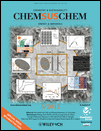
ChemSusChem
Connecting Chemistry with Sustainability for Global ImpactChemSusChem is a premier interdisciplinary journal, published by WILEY-V C H VERLAG GMBH, that focuses on the critical fields of Chemical Engineering, Energy, Environmental Chemistry, and Materials Science. Since its inception in 2008, the journal has consistently maintained a Q1 ranking across multiple categories, highlighting its role as a vital resource for researchers and professionals dedicated to advancing sustainable chemical processes and technologies. With an impressive impact factor, it ranks 12th in General Chemical Engineering and is highly regarded within its scopes, indicating the journal's commitment to publishing high-quality, innovative research that addresses global challenges in energy and environmental sustainability. Though it operates on a subscription model, its contributions are essential for those in academia and industry seeking cutting-edge developments in sustainable chemistry. As it approaches its convergence span through 2024, ChemSusChem continues to shape the future of sustainable chemistry, making it a must-read for students, researchers, and practitioners alike.
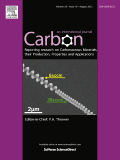
CARBON
Elevating Knowledge in Carbon ApplicationsCARBON is a leading peer-reviewed journal published by PERGAMON-ELSEVIER SCIENCE LTD, focusing on the realms of Chemistry and Materials Science. With an impressive impact factor, CARBON is ranked within the top quartile (Q1) of both fields in the 2023 Scimago Journal Rank, remarkably securing the 18th position out of 463 in General Materials Science and the 22nd position out of 408 in General Chemistry. Since its inception in 1963, the journal has been dedicated to publishing high-quality research that advances the understanding of carbon-based materials and their applications. Operating from the United Kingdom, CARBON provides an essential platform for researchers, professionals, and students alike to disseminate their findings and innovations. Although not an open-access journal, it offers access options that maintain the integrity and high standards of academic publishing. As a critical resource in its field, CARBON continues to foster scientific dialogue and development, significantly impacting current and future research.

EnergyChem
Empowering Researchers to Shape the Future of Energy.EnergyChem is a premier academic journal published by ELSEVIER, dedicated to advancing the field of energy chemistry and its applications in sustainable technologies. With a strong focus on biomaterials and innovative chemistry solutions, the journal has established itself as a leading platform within the research community, boasting remarkable rankings such as Q1 in Biomaterials, Chemistry (miscellaneous), and Energy (miscellaneous) for 2023. Notably, it ranks 2nd in both Materials Science and Energy categories, reflecting the high caliber of research it publishes, which is crucial for tackling pressing global energy challenges. Since its inception in 2019, EnergyChem has been committed to open and accessible research, making it an invaluable resource for researchers, professionals, and students striving for cutting-edge insights in energy conversion and storage. With its target audience in mind, the journal encourages submissions that explore innovative materials, processes, and applications that will contribute to a sustainable energy future.

Energy Materials
Advancing the Future of Sustainable Energy Solutions.Energy Materials is a pioneering journal published by OAE PUBLISHING INC, dedicated to the dynamic field of energy materials science and engineering. With a focus on advancing knowledge related to materials used in various energy applications such as batteries, fuel cells, and solar cells, this open-access journal aims to disseminate cutting-edge research and innovative methodologies to a global audience. By offering a platform for original research, reviews, and case studies, Energy Materials plays a crucial role in bridging the gap between materials science and energy technology, facilitating the development of sustainable energy solutions. Researchers, professionals, and students alike will find invaluable insights in its pages, fostering advancements in this essential sector. To explore the latest developments in energy materials, visit Energy Materials at OAE PUBLISHING INC.
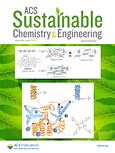
ACS Sustainable Chemistry & Engineering
Driving innovation for a sustainable world.ACS Sustainable Chemistry & Engineering is a premier journal published by the American Chemical Society, dedicated to advancing knowledge and innovation in the fields of sustainable chemistry and engineering. With an impressive impact factor and a consistent ranking in the Q1 category across various disciplines such as Chemical Engineering, Chemistry, Environmental Chemistry, and Renewable Energy, this journal serves as a vital resource for researchers, professionals, and students alike. Since its inception in 2013, the journal has been committed to publishing high-quality, peer-reviewed articles that address the critical challenges of sustainability in chemistry and engineering. With no open-access option currently available, the journal emphasizes the importance of premium scholarly communication. As the field continues to evolve, ACS Sustainable Chemistry & Engineering remains at the forefront of providing cutting-edge research that impacts our understanding and application of sustainable practices in the chemical sciences.
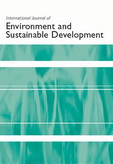
International Journal of Environment and Sustainable Development
Fostering dialogue for a sustainable tomorrow.The International Journal of Environment and Sustainable Development, published by INDERSCIENCE ENTERPRISES LTD, serves as a vital platform for researchers, practitioners, and policymakers engaged in the multidisciplinary fields of geography, renewable energy, and environmental sustainability. With an ISSN of 1474-6778 and an E-ISSN of 1478-7466, this journal has been disseminating critical research since its inception in 2002 and continues to expand its scope through 2024. Recognized within the Q3 quartile in Geography, Planning and Development and Q4 in both Management, Monitoring, Policy and Law and Renewable Energy, Sustainability and the Environment, it provides valuable insights into contemporary issues affecting our planet. While access options are limited to non-open access formats, the journal remains essential for those seeking to enhance their understanding of sustainable development practices and policies in a global context. The International Journal of Environment and Sustainable Development is not only an academic repository but also a catalyst for dialogue and innovation within the environmental sciences.
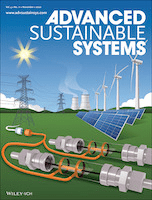
Advanced Sustainable Systems
Transforming Environmental Challenges into OpportunitiesAdvanced Sustainable Systems is a premier academic journal published by WILEY-V C H VERLAG GMBH, dedicated to the dynamic fields of environmental science and renewable energy. With an ISSN of 2366-7486, this journal has rapidly established its significance within the scientific community, achieving a prestigious Q1 ranking in both Environmental Science (miscellaneous) and Renewable Energy, Sustainability and the Environment categories as of 2023. Spanning the converged years from 2017 to 2024, it serves as a vital platform for researchers and practitioners alike, facilitating the dissemination of innovative ideas and groundbreaking research that drive sustainability initiatives globally. Although not an Open Access publication, its contributions are invaluable, reflected by its commendable Scopus rankings—#28 out of 233 in General Environmental Science and #49 out of 270 in Renewable Energy. As we face pressing environmental challenges, Advanced Sustainable Systems remains at the forefront, championing research that informs and influences sustainable practices and policies across the globe.

Joule
Leading the Charge in Energy BreakthroughsJoule, published by CELL PRESS, is a premier journal dedicated to the rapidly evolving field of energy research. Since its inception in 2017, Joule has established itself as a leading source of high-impact studies in energy, achieving an outstanding Q1 ranking in the Energy (miscellaneous) category and ranking #1 out of 73 in the general energy field, placing it within the 99th percentile according to Scopus metrics. The journal aims to advance the understanding of diverse energy forms and their applications, providing a platform for significant breakthroughs that can drive sustainable practices and innovative technologies. Through rigorous peer review and expert contributions, Joule serves as an invaluable resource for researchers, professionals, and students engaged in tackling some of the most pressing energy challenges of our time. Based in the United States, Joule continues to foster collaboration and interdisciplinary approaches in energy research, striving to illuminate pathways toward a sustainable future.

Frontiers in Energy
Connecting Researchers to Drive the Energy Revolution.Frontiers in Energy is a distinguished journal published by HIGHER EDUCATION PRESS, focusing on the dynamic and rapidly evolving field of energy engineering and power technology. Established in 2011, the journal serves as a pivotal platform for disseminating innovative research findings and practical applications that address critical challenges in energy systems. With an impressive Q2 ranking in 2023 and a Scopus rank of 81 out of 272 in the discipline, it highlights the journal's influential impact within the academic community, reflecting its commitment to high-quality research. Based in Beijing, China, the journal aims to promote open and accessible scientific discussion, facilitating collaboration among researchers, professionals, and students alike. As an open access publication, Frontiers in Energy ensures that valuable knowledge is readily available to a global audience, effectively contributing to advancements in sustainable energy solutions. Join the forefront of energy innovation by engaging with cutting-edge research that shapes our energy future.